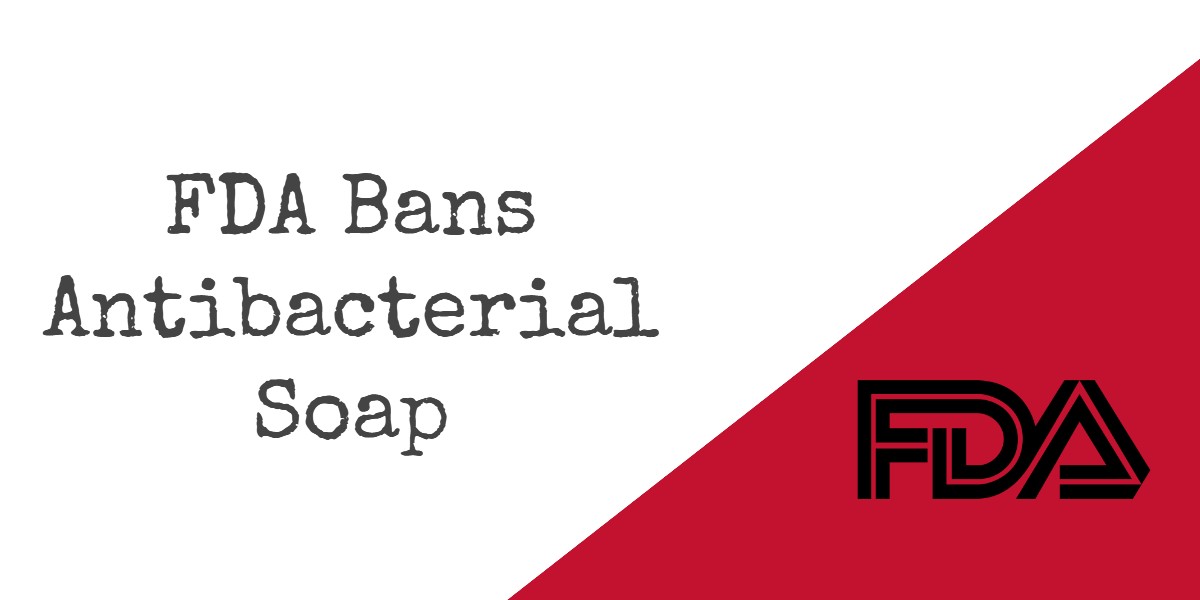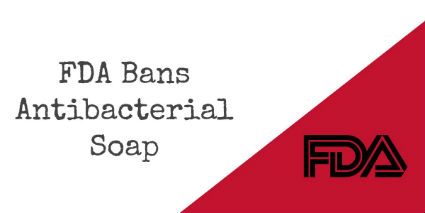Recently, the U.S. Food and Drug Administration (FDA) announced a ban on the future sale and marketing of antibacterial/antiseptic products containing a majority of a list of 19 active ingredients manufacturers had failed to provide adequate safety and health benefit related information on since 2013.

The FDA's Ruling on Antibacterial/Antisceptic Products.
The FDA has been investigating the safety and efficacy of topical antibacterial and antiseptic products since September of 1974.
The increased adoption, marketing, and use of antibacterial products in recent years sparked an increase in interest from the FDA and the U.S. Department of Health and Human Services (HHS), with three additional rulings coming in 1978, 1991, and 1994.
Eventually, in December 2013, the FDA proposed a rule to:
[sic]...require manufacturers of antibacterial hand soaps and body washes to demonstrate that their products are safe for long-term daily use and more effective than plain soap and water in preventing illness and the spread of certain infections.
-FDA issues proposed rule to determine safety and effectiveness of antibacterial soaps
Then again, in April 2015, the FDA requested:
[sic]...additional scientific data to support the safety and effectiveness of certain active ingredients used in health care antiseptics marketed under the over-the-counter drug monograph.
The response to the FDA's requests was both underwhelming and unconvincing, leading the FDA to publish a final ruling, stating:
[sic]...certain active ingredients used in over-the-counter (OTC) consumer antiseptic products intended for use with water...[sic]...are not generally recognized as safe and effective...[sic]...and are misbranded.
What Ingredients in Antibacterial Soap did the FDA Ban?
- Cloflucarban
- Fluorosalan
- Hexachlorophene
- Hexylresorcinol
- Iodophors (Iodine-containing ingredients)
- Iodine complex (ammonium ether sulfate and polyoxyethylene sorbitan monolaurate)
- Iodine complex (phosphate ester of alkyl aryloxy-polyethylene glycol)
- Nonyl phenoxy poly (ethylene oxy) ethanol-iodine
- Poloxamer--iodine complex
- Povidone-iodine 5 to 10 percent
- Undecoylium chloride iodine complex
- Methylbenzethonium chloride
- Phenol (greater than 1.5 percent)
- Phenol (less than 1.5 percent)
- Secondary amyl tri cresols
- Sodium oxychlordane
- Tribromsalan
- Triclocarban
- Triclosan
- Triple dye
The Trouble With Triclosan
Triclosan is an active ingredient in many consumer products 'intended to reduce or prevent bacterial contamination.'
While the science is not entirely in on Triclosan, current studies point to potentially harmful side effects in humans after prolonged exposure.
Side effects may include:
- A decrease in thyroid hormone levels.
- Contribution to the development of antibiotic-resistant bacteria, and potentially;
- Skin cancer.
With the exception of signs of positive results in toothpaste, the presence of Triclosan in most products appears to be wholly unnecessary.
For More Information:
Takeaway
The FDA's ruling does not include hand sanitizers or the use of the listed active ingredients for first-aid products.
Additionally, the ruling does not take effect for a year.
What it does is underscore the need to better educate ourselves about the products we use in an attempt to create a healthier world and the damage they may be doing to us.
If you would like to learn more about the benefits of professional cleaning services for your business, contact us today for a free quote!
In Bakersfield CA, call (661) 395-3009
In Fresno CA, call (559) 473-1790

